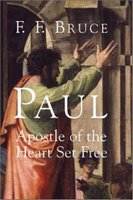David Willis, Clues to the Nicene Creed
 In Clues to the Nicene Creed, David Willis looks at the Christian faith through a study of the main themes of the most ecumenical of the creeds, the Nicene Creed. Willis's book isn't reallly a historical discussion of the Creed or its development, nor is it a look at the theology of the creed, so much as it is a collection of theological reflections on the major themes. In some ways it is a mini-systematic theology, though that is too strong of a term.
In Clues to the Nicene Creed, David Willis looks at the Christian faith through a study of the main themes of the most ecumenical of the creeds, the Nicene Creed. Willis's book isn't reallly a historical discussion of the Creed or its development, nor is it a look at the theology of the creed, so much as it is a collection of theological reflections on the major themes. In some ways it is a mini-systematic theology, though that is too strong of a term.
The strength of the book is that it covers a broad range of important topics, from the nature of faith to the nature of God to Jesus and the Spirit to the church. Willis looks at man of these major themes, and illumines some interesting facets. And many of his reflections contain some useful insights and novel approaches. One of these is his extended discussion of the Christian life as a life of forgiveness, of living an active compassion, and of living forward toward our resurrection life. Willis also does well to keep the lives of believers in view, and investigates how these doctrines can be lived out, probably the greatest strength of the book. He does inspire a vision of a Christian life than makes a difference in our interactions in society. Yet, I think the book has some weaknesses as well. Though Willis does look at some biblical material as he goes, this material mostly remains in the background. Though this probably fits with his intentions in writing, a stronger biblical foundation and more engagement with important texts would have greatly helped. His vision of the Christian life was also mostly sociological, involving our interactions with others moreso than with God. I also felt, as I mentioned above, that the book is best categoriezed as reflections, moreso than an "outline of the faith," brief or not, as the subtitle calls it.
The book was worth reading, and does an admirable job of keeping the applicability of theology in view, though I almost put it down a few times before finishing. Clearly he gives some useful insights, but I think better treatments are to be found. Alister McGrath's I Believe is one worthy alternative: a thoughtful reflection on the Apostles' Creed.



